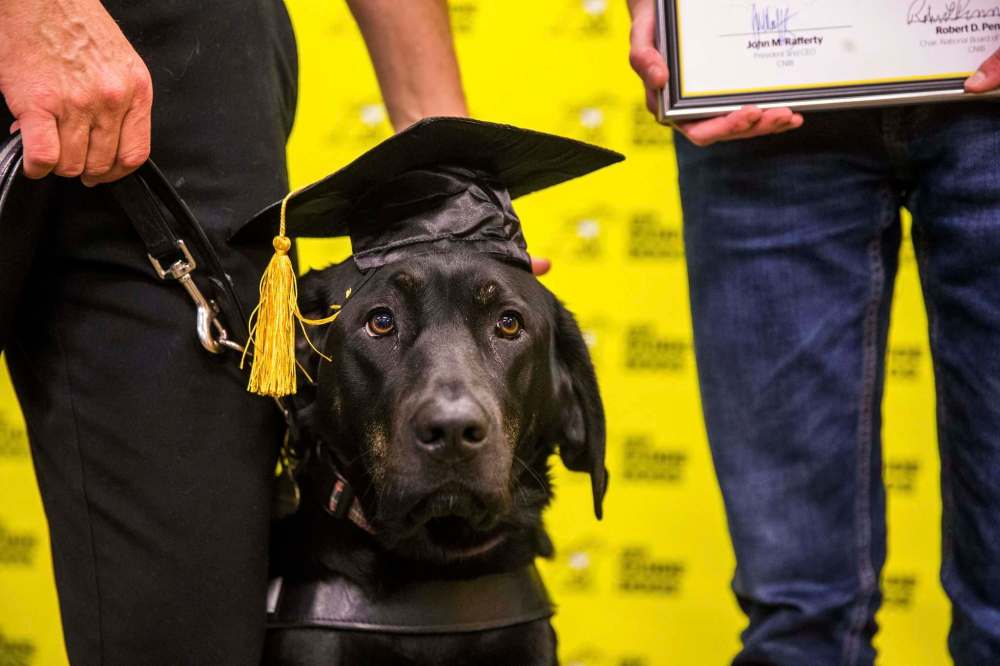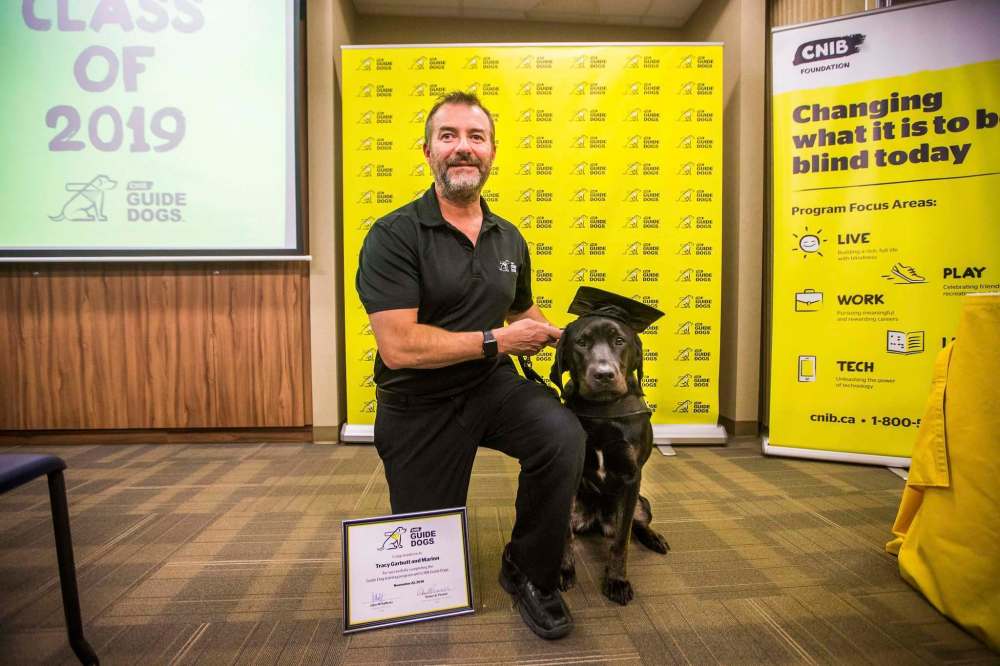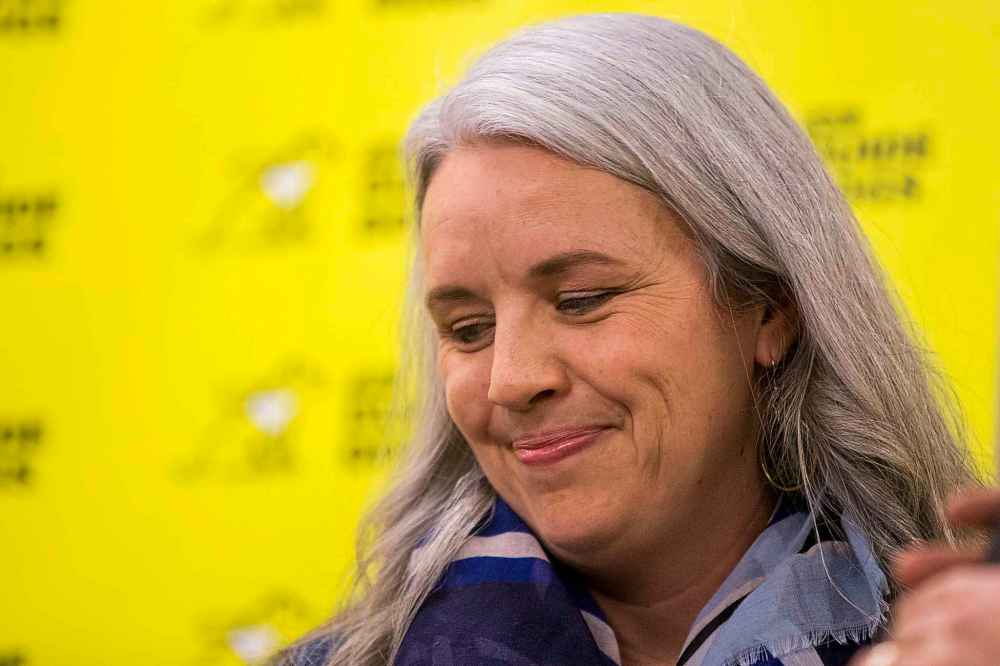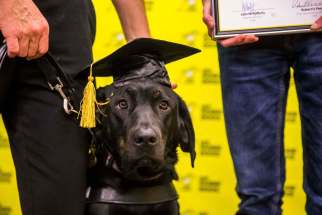Graduate trained to be a leader Black Lab calmly passes CNIB program to become city's newest guide dog
Read this article for free:
or
Already have an account? Log in here »
To continue reading, please subscribe:
Monthly Digital Subscription
$0 for the first 4 weeks*
- Enjoy unlimited reading on winnipegfreepress.com
- Read the E-Edition, our digital replica newspaper
- Access News Break, our award-winning app
- Play interactive puzzles
*No charge for 4 weeks then price increases to the regular rate of $19.00 plus GST every four weeks. Offer available to new and qualified returning subscribers only. Cancel any time.
Monthly Digital Subscription
$4.75/week*
- Enjoy unlimited reading on winnipegfreepress.com
- Read the E-Edition, our digital replica newspaper
- Access News Break, our award-winning app
- Play interactive puzzles
*Billed as $19 plus GST every four weeks. Cancel any time.
To continue reading, please subscribe:
Add Free Press access to your Brandon Sun subscription for only an additional
$1 for the first 4 weeks*
*Your next subscription payment will increase by $1.00 and you will be charged $16.99 plus GST for four weeks. After four weeks, your payment will increase to $23.99 plus GST every four weeks.
Read unlimited articles for free today:
or
Already have an account? Log in here »
Hey there, time traveller!
This article was published 25/11/2019 (2208 days ago), so information in it may no longer be current.
With Pomp and Circumstance playing on a small speaker, two-year-old Marion stood up, stretched and walked calmly to the front of the room, where she was presented with a certificate of completion and a tiny mortar board was placed on her furry head.
The black Labrador retriever with brindle paws is one of 25 dogs in the second graduating class, and the first in Winnipeg, for the Canadian National Institute for the Blind’s (CNIB) guide dog training program. On Friday, Marion was celebrated at the organization’s Winnipeg headquarters in front of a crowd of roughly 20 people and several fellow guide dogs.
Marion was entirely unbothered by all the attention during the hour-long ceremony, which is part of what makes her a great service animal.
“She’s very calm and relaxed… she really has a nice gentle soul to her,” said Tracy Garbutt, Marion’s handler and foundation relations program lead with CNIB.

Garbutt is legally blind and uses a cane to navigate the streets of Winnipeg. He has had guide dogs in the past, but a run-in with a semi-trailer truck while crossing Portage Avenue earlier this year prompted him to apply for a new dog.
“My cane went under the semi-trailer and my face hit the side of the trailer and then it started to drive away, luckily I was still standing and was able to back up,” he said.
He submitted an application with CNIB’s guide-dog program in late January and was matched up with Marion in July after an intensive two-week in-home training session.
“The training has been second to none. I’ve had dogs from other schools, which are awesome schools, but I figured I’d make a change and go through our foundation,” Garbutt said.
The organization has been providing support services and advocating for blind and partially sighted Canadians for more than 100 years. It launched its new guide-dog program in 2017. Previously, those with vision loss had to pay out of pocket or apply for funding for a dog raised and trained at private facilities in Canada or the United States. The CNIB covers all costs associated with its service dogs, which can be upwards of $50,000 over the course of an animal’s lifetime.
“Most dogs are in that seven- to eight-year range, in terms of their working life,” said Leonard Furber, executive director with Manitoba’s CNIB Foundation. “The guide dog program will support that from breeding to the passing of the animal through the generosity of our donors.”
It takes roughly two years to prepare a dog to work with a handler. Once a dog graduates, it has three possible career paths: guide dogs to help blind or partially sighted clients with day-to-day travel; buddy dogs to help prepare children with sight loss for future guide-dog partnerships; and ambassador dogs, partnered with CNIB staff, to help raise public awareness about the role of guide and buddy dogs.
The puppies come from a specialty breeder in Australia and are paired with volunteer puppy raisers across the country. The volunteers spend 12 to 15 months teaching the puppy basic obedience and socialization skills before they move on to work with a trainer.

Kristin Wiebe was one of eight Winnipeggers selected from hundreds of applicants to raise a puppy for CNIB. An eight-week-old golden retriever named Lilo arrived at the Wiebes’ home in 2018 and the family spent a year teaching her how to walk on a leash, go to the bathroom on command and to stay focused in the presence of distractions. Lilo was also a constant companion during outings.
“She would sit in the front seat beside me and we went everywhere, to school, to church, shopping,” Wiebe said. “She had a fantastic calm personality. She loved working; when we went out her ears would perk up ad her tail would wag.”
Wiebe has a personal connection to CNIB. Her son Luke was born with nystagmus, a vision condition that causes the eyes to jitter back and forth uncontrollably, and the organization provided an occupational therapist to support his development.
“It’s awesome to be able to give back because they helped us out so much as he was growing up,” Wiebe said.
“They absolutely loved her, when she was at home she was just a regular puppy. She (was) not meant to be our family dog and even though we talked about that constantly, it was still super hard.” – Kristin Wiebe
Even though Wiebe prepared her four children for Lilo’s eventual departure, it wasn’t easy to say goodbye in June.
“They absolutely loved her, when she was at home she was just a regular puppy,” Wiebe said. “She (was) not meant to be our family dog and even though we talked about that constantly, it was still super hard.”
Lilo has since been matched with a handler in Montreal and the Wiebes are looking forward to getting their next foster puppy in the new year.
For Garbutt, the dedication of volunteers like Wiebe and CNIB’s guide-dog trainers have given him a renewed sense of independence.
“I can’t remember the last time I just went out for a walk,” he said. “My spontaneity has improved; if I want to go do something now I have the confidence to do it.”

After Garbutt applied to the program, trainers came out to evaluate his home, lifestyle and mobility — good cane skills are required to get a dog — before matching him with Marion, who was raised in Halifax. Their first meeting was a sign of things to come.
“I sat down, Marion came up to me and gave me a big lick on the face and that told me that things were going to work out,” Garbutt said. “Every day we learn a little more about each other and… we’ve really bonded well and she really fits in with our family, and that’s half the battle.”
The family has two goldendoodles and Marion has been a calming presence in the household.
“She doesn’t buy into their craziness,” he said, laughing. “She can be a leader, so she’s not going to follow them in barking and that just shows a dog that’s confident and doesn’t have to rely on following the pack.”
Marion has also been good fit for Garbutt’s busy schedule.
“I’m up every morning at 5 a.m. to go to the gym, so we have long days and I’m in schools and doing education pieces, so I needed a non-reactive dog,” he said. “It means a lot to have Marion at my side.”
eva.wasney@freepress.mb.ca
Twitter: @evawasney

Our newsroom depends on a growing audience of readers to power our journalism. If you are not a paid reader, please consider becoming a subscriber.
Our newsroom depends on its audience of readers to power our journalism. Thank you for your support.
History
Updated on Tuesday, November 26, 2019 11:11 AM CST: Updates number of graduates.










